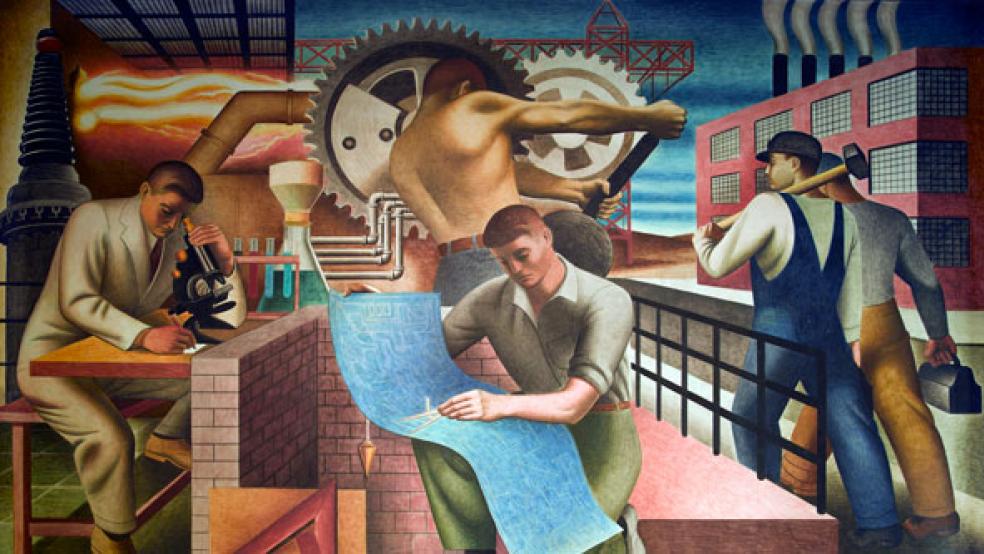
House Majority Leader Eric Cantor believes that Republicans must show their concern for those struggling in this economy if they want to regain their political footing. “We’ve got to be talking about helping folks,” he said Sunday on Meet the Press, “You’ve got so many millions of Americans who feel that they have become an afterthought.”
There’s a reason people feel that way. Republicans have refused to support any of the jobs proposals president Obama has put forward, the American Jobs Act is one prominent example, and they have even refused to support needed infrastructure spending that would increase employment and help the economy to grow in the future. If Republicans want to convince the middle class that they care about “helping folks,” they will have to explain why they’ve opposed needed programs that would put people to work. They will also need to explain how their core policy objective, trading social services the middle class relies upon for tax cuts for the wealthy, is good for middle class households.
President Obama also wants to change the conversation toward the needs of the millions of Americans who feel abandoned by politicians, and he intends to emphasize jobs and the economy in his State of the Union address. This is a welcome change. Too much of the national discussion in recent months has been focused on the national debt. Republicans have pushed this issue the hardest, and they have exaggerated the risk from the national debt in an attempt to realize their real goal of smaller government and, ultimately, lower taxes for the wealthy. But centrist Democrats have also allowed this issue to take precedence over other important problems such as providing jobs for the unemployed.
Instead of focusing on the debt, we should be discussing what we want the government to do. What are our priorities, what will they cost, and what can we, as a nation, afford? In the short-run, is there room for us to do more to help the unemployed? In the longer run, should government be bigger or smaller, and what sorts of tradeoffs are involved? Can the composition of spending and taxes be improved? How fast does the debt need to be reduced, and should it be reduced through tax increases, spending cuts, or both? As we get richer as a society – income doubles every thirty years or so – should the share of GDP devoted to helping people increase, or should government’s share of output be limited to historical averages as many conservatives argue?
As we discuss these important questions about the size and role of government, we need to remember something that has been forgotten too often amid Republican attempts limit government intervention into the economy. The government has an important role to play in overcoming market failures in the private sector. The private sector, on its own, will not provide the correct amounts of infrastructure, retirement security, health care spending, protection against monopoly and corruption, unemployment insurance, national defense, environmental regulation, education, food and drug safety, bank regulation, innovation, anti-trust action, safe working conditions, support of basic research, stabilization policy, and so on.
Fixing these market failures through government action does not distort private sector economic activity away from the optimal outcome as many on the right would have us believe, it moves us closer to the ideal textbook economy. We can debate whether the market-failures are large enough to justify government action, and how much and what type of intervention is required when it is. But when significant market failures exist – and there are many cases where they do – there is a clear scope for government action to improve economic outcomes.
The reelection of president Obama sent a message about the public’s view of the role of government, but many Republicans refuse to listen. That is a political liability, and Eric Cantor’s attempt to get Republicans to talk about “helping folks” when they speak to the public is an obvious attempt to reverse the political damage. Pretending to be on the side of the middle class while enacting policies that help businesses and the wealthy has worked well in the past, so it shouldn’t be surprising to see this tried again. Remember the failed promises of trickle-down economics?
Obama will have a chance to remind the public of these failed promises in his State of the Union address, and to direct the conversation toward the issues that are most important to typical households. They include jobs, the economy, and “the need to spend public money (on research, on roads, on education) to prepare Americans for a world where a warming climate, a nomadic labor force, and new technology are shutting doors and opening new ones across the national economy,”says Scott Wilson of the Washington Post.
It’s a good start on the discussion we need to have about the role of government in the economy, and an important pivot away from deficits, debt ceilings, fiscal cliffs, and the push for austerity that has dominated the national conversation in recent months.






